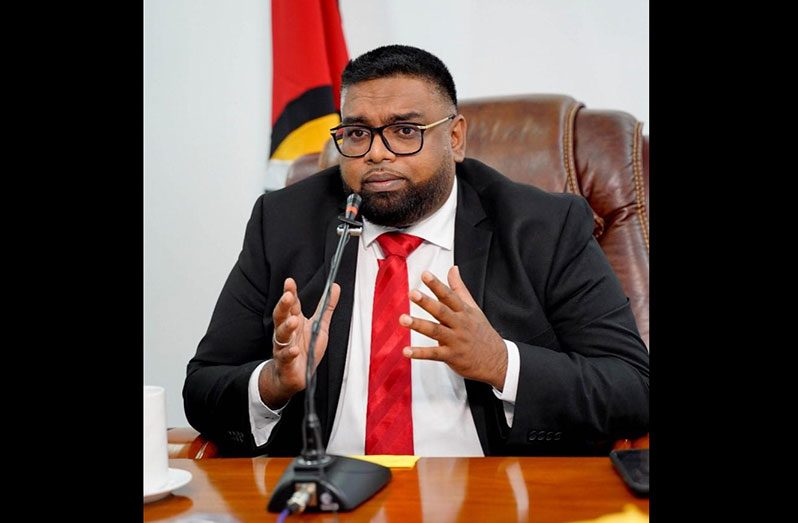— between Africa and CARICOM, says President Ali, to address issues threatening realisation of SDGs
GIVEN its shared interests and common objectives, President Dr. Irfaan Ali emphasised the need for there to be greater socio-economic collaboration between Africa and the Caribbean Community (CARICOM).
“Our regions represent creative and dynamic forces within the international community,” Dr. Ali told the Heads of States who attended the inaugural Africa-CARICOM Summit on Tuesday, and chaired by President of Kenya, Uhuru Kenyatta.
The Guyanese Head of State, in his address, said that the historic meeting provides an ideal platform for Africa and CARICOM to strategise, ahead of two critical global events – the United Nations’ General Assembly, and the United Nations’ Climate Change Conference (COP 26).
“It is therefore an opportune time for us to determine some common ideas and messages which we wish to convey to the global community,” President Ali suggested.
He expressed the view that a united approach must address critical issues such as the effects of the COVID-19 pandemic and its recovery efforts; climate change, mitigation and adaptation measures; food security; and cost of commodities and transportation – all of which threaten the realisation of the Sustainable Development Goals (SDGs) set out in the 2030 agenda.
“For us, the global pandemic awakens the harsh reality of the differentiating treatment between the developed and the developing world,” Dr. Ali posited. He reasoned that an amalgamated approach would also re-emphasise that “fundamentally, it is the developing world that suffers the most under these circumstances”.
As it is, President Ali said that the effects of the pandemic and its recovery require urgent attention. “We must have a forceful message on issues relating to rescheduling of loans, debt financing, access to capital in our rebuilding efforts, and an evaluation of the global vaccination system along with its failure to respond to the most vulnerable in the world,” the Head of State advised.
Most worrying, President Ali noted, are issues relating to climate change, which continues to be a serious threat that exacerbates challenges faced by Africa and Caribbean. “Developing countries like Guyana and our sister states in the Caribbean and Africa are facing great difficulties. We have not been historically responsible, but we suffer the greatest and are least equipped to respond,” Dr. Ali highlighted.
BEARING THE BRUNT
He lamented the fact that CARICOM and African countries continue to bear the brunt of increasing and more intense climate-related events. “We must, therefore, collectively advocate for greater financial flows to help us adapt to the impacts of the climate emergency, including through the establishment of a Global Vulnerability Fund,” Ali said.
He added that “the largest polluters and developed countries which have already achieved economic diversification by transforming much of their natural assets into commercial activities carry a greater responsibility in this respect.”
As it relates specifically to Guyana, Dr. Ali said that because it is one of the few nations that remove more carbon dioxide than it emits, the country should benefit economically from the service that its forests continue to provide to the global eco-system. “…and, to this end, we hope that discussions on the ‘rulebook’ under the Paris Agreement will advance at the upcoming COP26,” President Ali added.
He also referenced Guyana’s Low Carbon Development Strategy (LCDS), which was initiated by former President and current Vice-President, Dr. Bharrat Jagdeo, with the aim of finding a path to prosperity and development that is non-polluting.
LCDS
“The LCDS aims to transform Guyana’s economy to better deliver socio-economic benefits to our people by following a low carbon path while mainstreaming climate resilience, providing a model to the world of how low carbon, low deforestation, climate resilient development can be possible and beneficial for forested countries,” the President said.
He also urged other African and CARICOM countries to “emphasise a compensation system for the Blue Economy and safeguard the biodiversity”.
Additionally, President Ali said that the pandemic has re-awakened the vulnerability of developing countries, to food supply, as well as the fragility of markets and sensitivity to price changes.
“It is therefore essential that issues surrounding food security, supply and availability form an important part of our actionable agenda,” Dr. Ali asserted, as he pointed to the fact that the Caribbean has suffered immensely from the fallout in the rising cost of commodities and transportation services during the pandemic.
“We must therefore address these issues through a common theme as we, the developing economies, would find it even more difficult to cope with and rebuild post COVID-19. Having regards for all of the above, achieving the SDGs as outlined in agenda 2030 is severely threatened and we must all point this out to the global community,” Dr. Ali noted.
To this end, the said that Guyana looks forward to a sustained and strengthened relationship between Africa and the rest of the Caribbean.
“Africa and the Caribbean are no strangers to each other; we are brothers and sisters. Economic integration must be driven by people, technology, policies, and partnership aimed at one objective, the prosperity of both our peoples,” the Guyanese Head of State posited.
Similar sentiments were also shared by CARICOM Chairman, Gaston Browne, who said that, together, Africa and CARICOM have the ability to demand change in the international system. “
“Between the nations of the African Union and CARICOM, we are a population of approximately 1.4 billion people, with great natural and wealth-creating resources including oil, gas, agriculture, minerals, forestry, tourism, fisheries and much more,” Browne said.
He cautioned, however, that the changes would only materialise if all countries involved act harmoniously.
“Together we have the voting power of 69 nations in the United Nations and all its subsidiary organisations, including the World Trade Organisation. We have global bargaining power. But only if [we] use it effectively,” the CARICOM Chairman posited.




.jpg)










